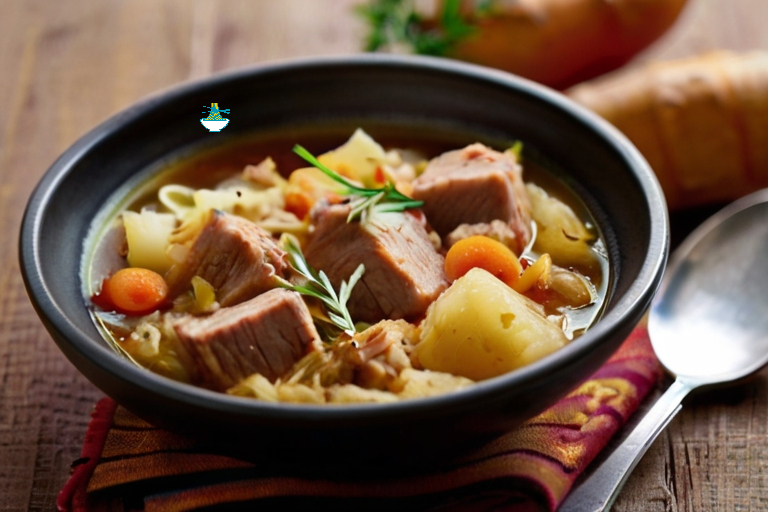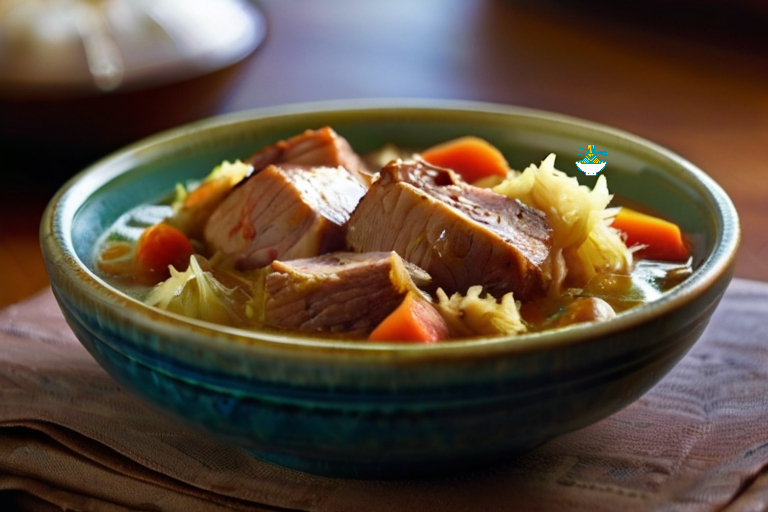Indulge in the heartwarming flavors of Estonia with this traditional dish, Mulgikapsad. Hailing from the Mulgimaa region, Mulgikapsad is a hearty and flavorful stew featuring cabbage, pork, and potatoes, simmered together with aromatic spices. This beloved Estonian comfort food embodies the essence of home-cooked goodness, perfect for chilly evenings or gatherings with loved ones. Discover the rich culinary heritage of Estonia through this delightful Mulgikapsad recipe, brimming with warmth and tradition.
Ingredients:
- 500g pork shoulder or pork belly, cubed
- 500g sauerkraut, drained
- 3 medium potatoes, peeled and diced
- 1 large onion, chopped
- 2 cloves garlic, minced
- 2 tablespoons vegetable oil
- 1 tablespoon caraway seeds
- 1 teaspoon black pepper
- 1 teaspoon paprika
- 1 bay leaf
- 2 cups beef or vegetable broth
- Salt, to taste
- Fresh parsley, chopped (for garnish)

Instructions:
1- Heat vegetable oil in a large pot over medium heat. Add the chopped onion and minced garlic, and sauté until softened and fragrant, about 3-4 minutes.
2- Add the cubed pork to the pot and cook until browned on all sides, about 5-6 minutes.
3- Stir in the caraway seeds, black pepper, and paprika, and cook for another 2 minutes to toast the spices.
4- Add the drained sauerkraut to the pot, along with the diced potatoes and bay leaf. Pour in the beef or vegetable broth, ensuring that the ingredients are fully submerged.
5- Bring the stew to a boil, then reduce the heat to low and let it simmer, covered, for about 1.5 to 2 hours, stirring occasionally, until the pork is tender and the flavors are well combined. If the stew becomes too thick during cooking, you can add a bit more broth or water as needed.
6- Once the stew is cooked to your liking, taste and adjust the seasoning with salt if necessary.
7- Serve the Mulgikapsad hot, garnished with freshly chopped parsley for a burst of freshness.
8- Enjoy this hearty Estonian winter dish with some crusty bread or boiled potatoes on the side, and savor the comforting flavors of sauerkraut, tender pork, and aromatic spices.
Nutritional Values:
Here's an approximate nutritional breakdown for the main ingredients used in the Mulgikapsad recipe:
Pork Shoulder (500g):
- Calories: Approximately 1100 kcal
- Protein: Approximately 90g
- Fat: Approximately 80g
- Carbohydrates: Approximately 0g
benefits:
- Excellent source of protein, essential for muscle growth and repair.
- Provides essential vitamins and minerals, including B vitamins (such as B12 and niacin), zinc, and phosphorus.
Sauerkraut (500g):
- Calories: Approximately 100 kcal
- Protein: Approximately 5g
- Fat: Approximately 0g
- Carbohydrates: Approximately 20g
- Dietary Fiber: Approximately 10g
benefits:
- Rich in probiotics, which promote gut health and digestion.
- High in fiber, aiding in digestion and promoting a feeling of fullness.
- Contains vitamin C, an antioxidant that supports the immune system and collagen production.
Potatoes (3 medium):
- Calories: Approximately 300 kcal
- Protein: Approximately 6g
- Fat: Approximately 0g
- Carbohydrates: Approximately 70g
- Dietary Fiber: Approximately 8g
benefits:
- Good source of carbohydrates, providing energy for daily activities.
- Rich in potassium, which helps regulate blood pressure and muscle function.
- Contains vitamin C, B vitamins, and dietary fiber, supporting overall health and digestion.
Onion (1 large):
- Calories: Approximately 60 kcal
- Protein: Approximately 2g
- Fat: Approximately 0g
- Carbohydrates: Approximately 14g
- Dietary Fiber: Approximately 3g
benefits:
- Contains antioxidants such as quercetin, which may have anti-inflammatory and immune-boosting properties.
- Provides fiber, aiding in digestion and promoting gut health.
- Rich in vitamin C and other vitamins and minerals, supporting overall health.
Vegetable Oil (2 tablespoons):
- Calories: Approximately 240 kcal
- Fat: Approximately 28g
benefits:
- Provides essential fatty acids, such as omega-3 and omega-6, important for brain function and heart health.
- Contains vitamin E, an antioxidant that helps protect cells from damage.
- Can help improve the absorption of fat-soluble vitamins (A, D, E, and K) from other foods.
Caraway Seeds (1 tablespoon):
- Calories: Approximately 20 kcal
- Protein: Approximately 1g
- Fat: Approximately 1g
- Carbohydrates: Approximately 3g
- Dietary Fiber: Approximately 2g
benefits:
- May aid digestion and relieve symptoms of indigestion, such as bloating and gas.
- Contains antioxidants and anti-inflammatory compounds that may help reduce inflammation and support overall health.
Spices (Black Pepper, Paprika, Bay Leaf):
- Negligible caloric content
benefits:
- Black pepper may improve digestion and enhance the absorption of nutrients from other foods.
- Paprika contains capsaicin, which may have antioxidant and anti-inflammatory properties.
- Bay leaf is rich in vitamins A and C, as well as minerals like calcium and magnesium, supporting immune function and bone health.
Beef or Vegetable Broth (2 cups):
- Calories: Approximately 20-30 kcal
- Protein: Approximately 2-4g
- Fat: Approximately 0-2g
- Carbohydrates: Approximately 2-4g
benefits:
- Provides hydration and can help replenish electrolytes.
- Contains essential nutrients extracted from bones, vegetables, and herbs used in the broth-making process.
- Can soothe the digestive system and support gut health.
Please note that these values are approximate and can vary based on factors such as brand, cooking methods, and specific ingredients used.


Comments